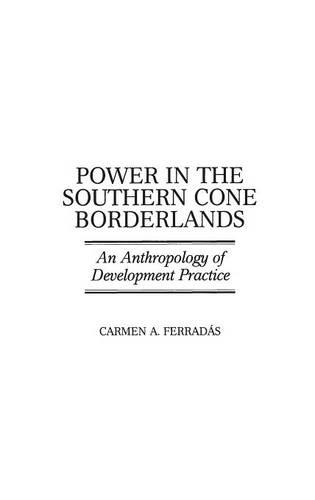
Power in the Southern Cone Borderlands: An Anthropology of Development Practice
(Hardback)
Publishing Details
Power in the Southern Cone Borderlands: An Anthropology of Development Practice
By (Author) Carmen A. Ferradas
Bloomsbury Publishing PLC
Praeger Publishers Inc
23rd July 1998
United States
Classifications
Tertiary Education
Non Fiction
Political activism / Political engagement
Development economics and emerging economies
Cultural studies
322.40982
Physical Properties
Hardback
240
Description
Development is not an all-powerful machinery imposing its will upon powerless actors. Rather, it is a complex process that brings together multiple actors with diverse agendas. Participants' power in affecting outcomes results from their ability to mobilize discursive and material resources and to control and manipulate time and spatial contexts. This work critically examines development practices and various forms of collective action based on detailed ethnographical analysis of the Yacyret hydroelectric project. The story unfolds in the borderlands of Paraguay and Argentina in the heart of the Latin American Southern Cone where local political cultures are responding to global forces that now dictate economic integration. Although relatively unknown today to the world, this area promises to exert a strong global impact in the near future. The saga of the Yacyret hydroelectric project on the Argentina-Paraguay border not only illustrates the radical change in the power dynamics of the Latin American Southern Cone region, but also reflects the transformation of development discourse and practice during the last decades. It examines the relationship between the weakened role of the nation-state in decision making and the emergence of nongovernmental organizations and grassroots movements as key development actors. Because the Yacyret dam is being built in the borderlands of two countries as a binational undertaking, it threatens the boundedness of nation-states precisely where sovereignty is traditionally guardedthe national frontiers. Under these and other global challenges of deterritorialation such as processes of regional integration encouraged by Mercosur (Common Market of the South), popular conflicts have become spatialized, reflecting both the resilience of national imaginings and histories of exclusion and exploitation. This study demystifies populist and romanticized academic constructions of subaltern groups. It shows that the outcomes of popular struggles can be one of accomodation and cooperation and not resistance. Nonetheless, they constitute serious threats to planned development. It challenges current approaches in development that advocate participation, empowerment, and communication.
Reviews
"In her saga of the Yacyreta dam project in Argentina, Carmen Ferradas traces the changes in the dynamics of development in the Latin American Southern Cone from one promoting national and regional economic growth and social well-being, to a stage in which development profects were the target of corruption charges, only to see them glorified as a monument of regional progress. She demonstrates how common market blocks and large-scale projects over the past two decades are affecting a tri-national area, transforming notions of national sovereignty as they draw Argentina into the superblock of Mercosur. She illumunates the transnationalization of civil society as residents in border countries affected engage in discourses with their counterparts. In the various discourses that emerge in the course of the local challenge to the controls exerted over their lives by powerful operators we learn of the paradoxical emergence of spatial fragmentation in the new global processes of accumulation."-June Nash Distinguished Professor The University of Chicago
Clear writing and remarkably effective organization enhance these stories so that one comes away with an appreciation for the different premises, aims, and tactics of the constituencies. Unlike other studies of flawed development projects, this one is written by a participant-observer who has long known the area and the people. Ferradas's unusually detailed insight into the project and its personnel leads to a frank discussion of anthropology's ambivalent role in the Third World development process....An excellent bibliography, good maps, and a table support the well-executed text. All levels.-Choice
"Clear writing and remarkably effective organization enhance these stories so that one comes away with an appreciation for the different premises, aims, and tactics of the constituencies. Unlike other studies of flawed development projects, this one is written by a participant-observer who has long known the area and the people. Ferradas's unusually detailed insight into the project and its personnel leads to a frank discussion of anthropology's ambivalent role in the Third World development process....An excellent bibliography, good maps, and a table support the well-executed text. All levels."-Choice
Author Bio
CARMEN A. FERRADS is Assistant Professor of Anthropology at Binghamton University, State University of New York. She has taught at the Universidad Nacional de Buenos Aires and at the Universidad Nacional de Misiones, Argentina.
